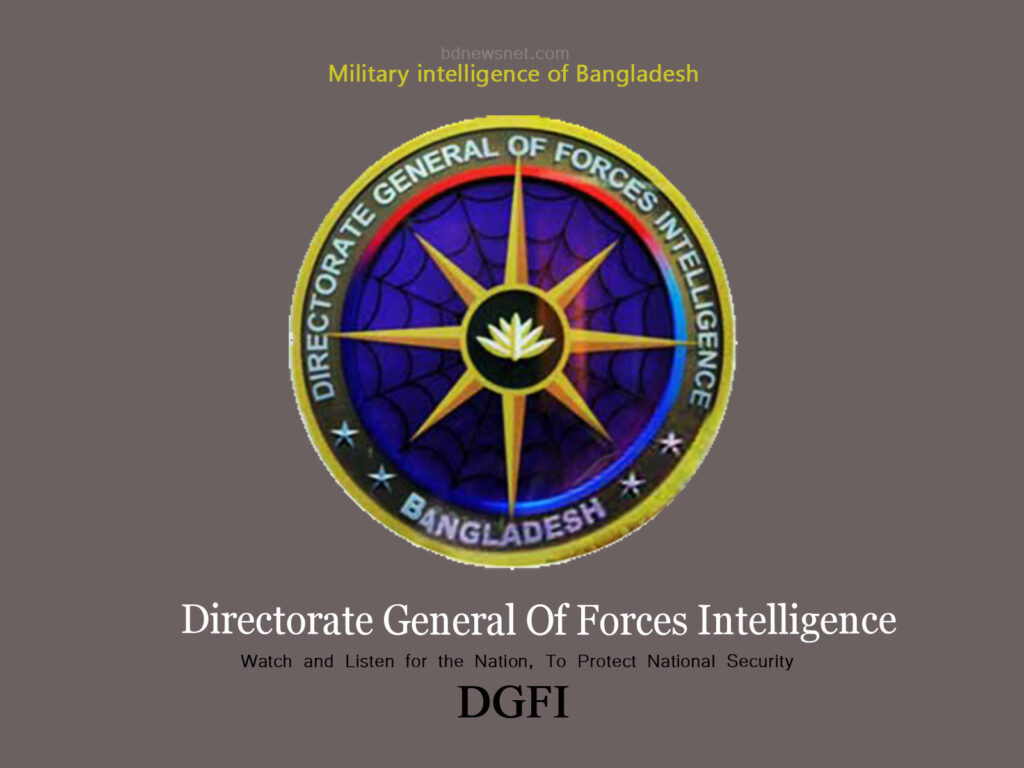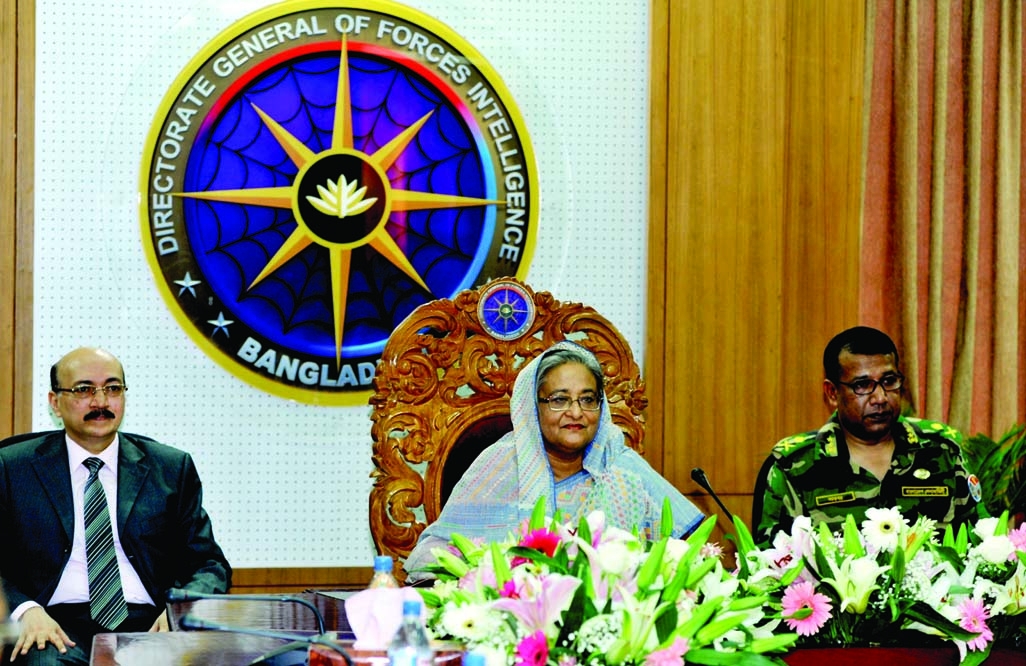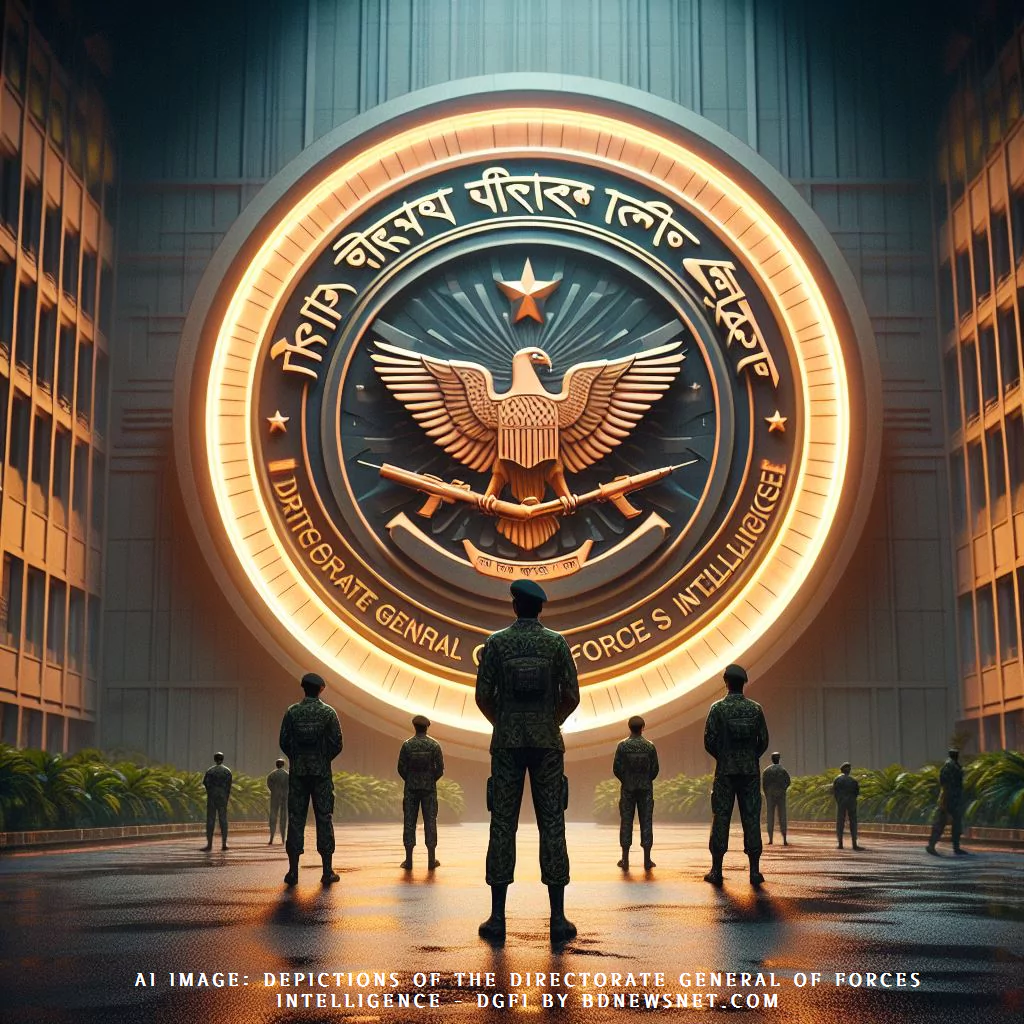The Directorate General of Forces Intelligence, commonly known as DGFI, stands as Bangladesh’s most influential intelligence agency, operating both within and beyond the nation’s borders. Its primary mission is to safeguard national security and uphold the paramount interests of Bangladesh. DGFI plays a pivotal role in ensuring the sovereignty and security of the country
The Directorate General of Forces Intelligence (DGFI) is the military intelligence agency of Bangladesh. DGFI reports to the Director-General and provides intelligence for the Prime Minister, the Cabinet and the Armed Forces of Bangladesh. It was formed in 1972 as the Directorate of Forces Intelligence (DFI) and reorganized in 1977 as the DGF
DGFI meaning?
DGFI stands for “Directorate General of Forces Intelligence” and it is the principal military intelligence agency of Bangladesh. Its main function is to provide intelligence support to the Bangladesh Armed Forces and the Ministry of Defence. DGFI is also responsible for collecting and analyzing information related to national security, both domestically and abroad. The agency was established in 1977 and is headquartered in Dhaka, Bangladesh.
DGFI and its similarity with the CIA
DGFI (Directorate General of Forces Intelligence) of Bangladesh and CIA (Central Intelligence Agency) of the United States are both intelligence agencies, but they operate in different countries and have different mandates.
While the CIA is responsible for providing intelligence to support US national security objectives, DGFI is primarily focused on supporting the military and defence needs of Bangladesh. Additionally, the CIA is a civilian agency, while DGFI is a military agency.
However, like the CIA, DGFI is involved in intelligence collection, analysis, and operations. Both agencies also conduct activities related to counter-terrorism and counter-intelligence
With a motto “Watch and Listen for the nation, To protect national security ” DGFI already established itself as one of the top intelligence agency in Asia. DGFI is the foreign military intelligence section of the Bangladesh Armed Forces. Over the years, Its role has transformed to both military and non-military intelligence gathering and the agency is active in more than 45 countries worldwide.

| Formed | 1972 (reformed in 1977) |
|---|---|
| Jurisdiction | President of Bangladesh |
| Headquarters | DGFI Headquarters, Dhaka Cantonment, Bangladesh |
| Motto | Watch and Listen for the nation, To protect national security |
| Employees | 12,000 (estimate) |
Bangla version :
The primary function of DGFI is the collection of foreign military intelligence, however, during recent times, the agency has extended its role economic and political intelligence inside and outside the country.

It is responsible for collecting foreign intelligence and monitoring internal political affairs. It monitors disaffection within the ranks and runs counterintelligence operations.
The recruitment of DGFI staff is undertaken by the Armed Forces. The DGFI was structured to be manned by officers from Bangladesh Army, Navy, and Airforces.DGFI has its own recruiting system for civilian operatives.
(adsbygoogle = window.adsbygoogle || []).push({});
Notable foreign operations of DGFI
DGFI, like any other intelligence agency, They have conducted numerous operations over the course of decades.
India
- One of most significant recent accomplishments was DGFI’s direct role in preventing a terror attack in Kolkata scheduled to coincide with India’s April – May elections. The DGFI has carried out a number of successful operations targeting Lashkar-e-Taiba and other individuals associated with transnational terrorist organizations on a priority basis as it poses a security risk not only for India’s national security but also for Bangladesh. Indian government officials have praised DGFI for their successful operation which led to the arrest of three cell members involved in planning the attack.
- A Bangladeshi DGFI agent concealed his nationality and joined R&AW where he was known as Diwan Chand Mallik. He was known to have obtained important intelligence which was damaging for India’s national security. He joined the agency in 1999 and used to live in East Delhi. A case of cheating and forgery was filed against him at the Lodhi Colony police station on the basis of a complaint by a senior RAW official. No trace of him was found afterwards.[14]
- Over the years, DGFI has been accused several times of aiding Indian separatists from North-East and Kashmir.
- Indian leading newspaper; DNA, published a report in 2008 claiming the presence of around one hundred DGFI operatives in East India.
- According to Indian Intelligence analysis, Operation Pin Code was launched by DGFI in 2004. The operation was intended to extend DGFI influence over West Bengal and Assam State Government.
- On 7 April 2020 one of the assassins of Sheikh Mujibur Rahman, Captain (Rtd.) Abdul Majed was arrested by Counter Terrorism and Transnational Crime Unit of Bangladesh Police. According to Kolkata Police he was seen being followed by 4 well-built men on 22 February in the CCTV footage. With the help of cellphone location tracking, police guessed that Majed was taken to Howrah from Malda, West Bengal. Then he was taken to Guwahati from Shillong and made to cross the Dawki border illegally to enter Bangladesh. According to CBI it was probably a covert operation of DGFI.
Nepal
- According to several sources, Bureau 3 of the DGFI is tasked with handling affairs in Nepal, Sri Lanka and Bhutan.
- In 2014, DGFI tracked down Indian Mujahideen‘s top commander, Zia Ur Rehman in Nepal. The operation was executed after a formal request from India’s R&AW and Nepal’s law enforcement agencies.
United Kingdom
- According to several leading British newspapers, United Kingdom’s Home Secretary Jacqui Smith, several high-level MI5 and MI6 officials flew to Dhaka for meeting with senior officials of Directorate General of Forces Intelligence. She urged that DGFI investigate a number of British nationals whom the British security agencies found to be suspicious. As a result, A number of British suspects were taken to DGFI’s secret interrogation centre, known as the Task Force for Interrogation cell (TFI). The British High Commission, Dhaka has rejected the allegations, stating that our security cooperation with other countries is consistent with our laws and with our values. High Commissioner Stephen Evans acknowledged that British and Bangladeshi intelligence agencies cooperated in certain areas, which includes sharing of information which may be relevant to the security of either country.[20]
The Logo of DGFI

On 14 May 2014 PM Sheikh Hasina Unveiled the New Monogram/logo of DGFI. The Monogram itself explain the characteristics and functions of Bangladesh Elite Intelligence Unit.
The round monogram of the DGFI, which has two circles at the outside and inside the inner circle on purple background another internal circle, the national emblem of Bangladesh placed on the green background at the center of the monogram, Water Lilly expressing the ethnicity of independent sovereign Bangladesh, light emission is shown around the circular Water Lilly . The eight light emission around the Water Lilly expressing Patriotism, loyalty, Discipline, Concentration, Alertness, Prudence, and Efficiency of the activities of the agency.
Dark purple in the main background is the mixture of the basic colors of the three forces which expresses the importance of combined activities of three forces. The spider web indicates the detective activities of the agency.
At the bottom “Bangladesh” Besides ” Bangladesh, ” there are two stars at each side and a total of four stars representing the four fundamental principles of the constitution of Bangladesh Nationalism, Secularism, Socialism and Democracy.
(adsbygoogle = window.adsbygoogle || []).push({});Functions :
DGFI is operationally responsible for providing national security and intelligence information to the Bangladesh government and armed forces. DGFI’s Intelligence operations seek to provide the policymakers and military commanders with an early warning of impending situations.
- Counterintelligence
- Apprise Bangladesh Government with important overseas events.
- Apprise Bangladesh Government about any activities that threaten National security.
- Cyber Intelligence
- Military intelligence: Provide Bangladesh Armed Forces with foreign intelligence on other nations’ Armed forces.
- Joint Intelligence: Works with Special Branch of Bangladesh Police and Rapid Action Battalion to gather detective and criminal intelligence.
- Air Intelligence: Gather intelligence on air forces around the world.
- Naval Intelligence: Gather intelligence on the advancements in other nations’ navies and maritime intelligence.
Accordingly, it is the responsibility of the intelligence Agency to continuously monitor and assess threats in order to facilitate commanders in launching timely and appropriate countermeasures. Such measures would encompass conduct of combat intelligence, counterintelligence and security intelligence.
- The collection, collation, evaluation, and dissemination of intelligence on the threat of sabotage, subversion, and espionage within the area of responsibility.
- Investigation on breaches of military security within the area of responsibility.
Failures :
On 25 February 2009, The paramilitary Force BDR Revolt resulted in the death of The Chief of the BDR, the Deputy Chief and all 16 Sector Commanders total 57 Army Officer.
After the independence of Bangladesh, it is the biggest military loses in a planned attack on Bangladesh Armed Forces. According to conspiracy theory, one or more Foreign Intelligence agency masterminded the attack by using common dissatisfaction in various ranks of the paramilitary force.
Despite DGFI’s reputation of a silent watchdog and enforcer of the Constitution of Bangladesh. DGFI’s intelligence failure in The Pilkhana massacre reflects its lackings in CounterIntelligence and capability to provide intelligence for Bangladesh Government and Bangladesh Armed Forces.
(adsbygoogle = window.adsbygoogle || []).push({});Success :
The elite DGFI is the Nations primary watchdog and enforcer of Bangladesh constitution. As a Military Intelligence agency, Its work in secret to protect the interest of Bangladesh. Sometimes its had to interfere in the violent political situation to establish law and order. The public trust and respect for the organization are high.
DGFI’s Counter-Terrorism and Intelligence Bureau played a vital role against Islamic militants, various organized crime unite, and separatist insurgency in Bangladesh. Various successful operation against religious extremist group broke the chain of command and organizational structure.
A DGFI Agent believed to be named Diwan Chand Mallick worked in India’s foreign intelligence unite RAW for six years and obtained various classified documents before disappearing in May 2005.
The functions and priorities of DGFI have changed throughout the years and vary with the country’s political situations and foreign affairs. DGFI maintains active collaborations with other secret services around the world. It maintains a close relation and shares intelligence and training with the New Zealand’s GCSB, Russia’s FSB, China’s MSS, and America’s CIA.



